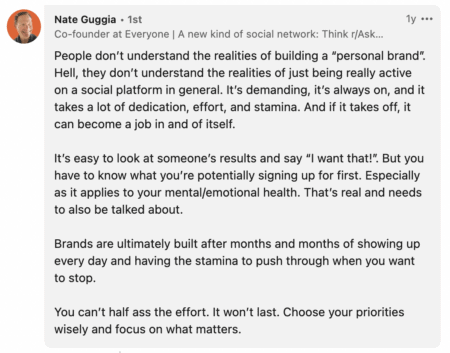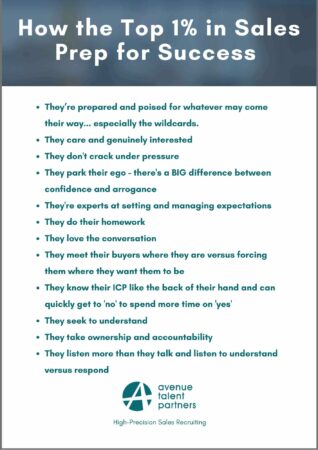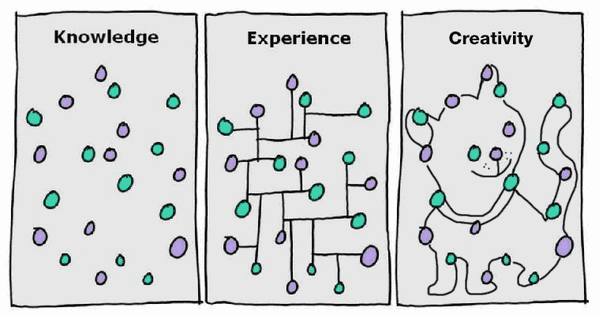
Preparing for a Sales Interview: What Hiring Managers Really Want
If you’re preparing for a sales interview and are asking yourself these things:
- “What’s really going on inside the heads of the people interviewing me?”
- “What actually works in sales interviews?”
- “Why can’t I ever get any real feedback?”
- “How do I stand out?”
You’re not alone. I talk to a lot of people in the same boat every day and it comes up during Thursday Night Sales weekly.
I’ve been teaching people the techniques that actually work for years from my time in HR Tech, Sales, and Recruiting… seeing people go from having no interviews to landing the role of a lifetime in weeks with my advice.
Here’s what hiring managers are actually looking for!
Your personal Reputation is a Big Deal
“We want to know about you as a person…. add a human touch to your amazing sales stats.”
No longer is landing a remarkable sales role simply about having a great resume, submitting an application online, and answering questions “well enough” in interviews. It’s all about differentiation and authenticity backed by a track record of success – just like it is when you’re selling to your customers too.

So unless you have a strong personal brand with a body of work to back up all of the fancy words posted, while truly illustrating how you are uniquely suited for joining their team, you’re going to get lost in the sea of people they talk to.
So now what?
It Starts with Why
In his book Start With Why, Simon Sinek breaks down how great leaders inspire action and how industry-leading companies create cult-like followings around their products and services.
If you haven’t read the book (or seen his legendary TED Talk), this happens thanks to a compelling “why” or “belief” that your followers can get behind.
This TED Talk clip breaks it down well using Apple as an example:
This is the power of a “why” – and what makes the customers of companies like Apple line up around the block the day a new phone is released rather than just waiting a week to get it.
Their customers believe what they believe and literally can’t wait to get their hands on the latest thing they release.
Above and beyond anything else, alignment is the name of the game. That’s the goal.
Why This Matters for Interviews…
Now imagine what would happen if your employees had that kind of fervor for the company too.
They’d come in fired up every day and probably be way more productive (17% more productive with 24% less turnover in fact).
This is why the very best companies look for a compelling “why” in those that they seek to bring on to their sales team. As it’s been said, “the first sale has to happen in the heart of the salesperson” – otherwise it’s hard to get your customers excited about your products/services too.
So you need to get clear and right with your why. Making it crystal clear that your “why” or personal vision is in line with theirs too.
These are questions you should be able to answer (that you’ll likely be asked in interviews as well):
- Why sales? What keeps me here?
- When I’ve been the happiest in my job, how would I describe what that looked like and why it was the case?
- What do I do best?
- What do I loathe doing?
- What motivates me to help my buyers?
- Why should I make a move now?
Make sure you can answer those questions authentically and honestly. As the Japanese say, find your Ikigai (reason for being):

These are crucial questions to think about to know what you gets you fired up to slay the day! Otherwise, what’s the point?
Prepare your soundbites ahead of time and have them dialed in for the interview.
Make sure you’re able to easily and clearly speak to:
📍Where you did it
📍Why you did it
📍Who you did it with
📍How you did it
📍The outcomes
📍How you improved
📍Lessons learned
Know these details like the back of your hand and have 2-3 “power statements” for each.
As you get it down on paper, ask yourself, “so what?” Why would a potential employer care/be compelled to carry on the conversation?
Remember, you only have a short amount of time to connect the dots.
Make it count.
Research the Company (Using These Tools)
I talk to many salespeople and sales leaders who actually don’t do much (if anything) to get a feel for the company’s world before they interview.
Absolutely not!
You need to be well informed before you ever set foot in the interview room. It’s how you’ll make sure to ask great questions and give great answers that are timely, relevant, and insightful.
After all, you wouldn’t do that on a sales call and expect to be successful… the same should be true here.
I take the business we do here at Avenue Talent Partners seriously and vet our clients just as much as we’d vet any sales leader we’d bring their way. These are some of the ways I conduct my research.
LinkedIn Sales Navigator
Most companies are very active on LinkedIn. Spend time on their feeds, the feeds of the people you’re interviewing with, and they’re employees to see what they are sharing and what’s top of mind. LinkedIn Sales Navigator is a “must-have” tool to stay on top of what’s happening within a particular company, key decision makers, and their competitive landscape.
Owler
It’s important to understand the competitive landscape the company you’re interviewing with sits in. You’ll want to be able to speak intelligently about competitors they’re going up against, how they compare, what differentiates them, etc. Owler is a great (FREE!) tool for that.
Crystal
The way we connect with people trumps all. Crystal provides me with priceless insight to help me peel back the layers to put my best foot forward.
Lavender
When it comes to email, this is a game-changer. How we communicate in the written form is just as important as anything else.
Pro tip: ALWAYS send a thank you email. Even if the role isn’t for you. It’s a big, small world and you never know when your paths will cross again.
Blogs
Blogs can be a great source of news on any company you’re interviewing with. I specifically like to read sites like PitchBook, Business Insider, OpenView Labs, Both Sides of the Table, TechCrunch, and Fast Company to learn about startups and SaaS and the landscapes they occupy.
Fun fact: I kick it old school and love the power of Google Alerts to keep me on top of the startups and people I care to keep track of the most.
How to Use This Information in Interviews:
The more you do this kind of research, the more you’ll look like a smart, motivated, and focused person that they want on their team.
You’ll be able to ask intelligent questions that show your thoughtfulness and desire to find a solution that works for both of you – something you should be doing in your sale process with your buyers as well.
An example:
“I saw a post [PERSON ON THEIR TEAM] shared the other day about [XYZ thing] and was really intrigued. This is something I dealt with when I first started with [YOUR COMPANY] and helped me increase my pipeline by 20% within 60 days. How has this affected the overall pipeline for the team?”
Think about how any piece of information you find during your research is compelling to you and how it relates to their business and you joining their team.
Find creative ways to connect the dots with great questions and answers to theirs!
Remember, Hiring Managers care about:
- How you can help them reach goals
- How you can help them solve problems
- How you can help them get better
- How you’ll do all three of these things for their buyers
- How you’ll fit into the company and team
Know Your Numbers and Process Inside Out
“If you can’t talk to me about your process, I can’t tell if you’re really a winner or if you just got lucky. Don’t just tell me you won – tell me how and why you won… tell me what you did to win. Otherwise, I don’t know if that great success you had was really your success at all.”
Context is king. While having impressive sales numbers is important, it is far more important that you as a salesperson can articulate HOW and WHY you achieved your numbers.
Otherwise, how will Founders and Sales Executives know you can transfer that same success to their team too?
Here are a few things you need to be able to speak to in a concise but compelling fashion (make sure you have your answers prepared before the interview).
Can you say…
- I know my numbers. What are your monthly, quarterly, and annual attainments? You must be able to answer this question without hesitation. Otherwise, you will look like you’re hiding something or not serious about your career.
- I can explain how I back into my numbers. Can you explain how many deals you’ve closed, how long your sales cycle is, and what’s involved? Who your buyer is? The win rate of my opportunities? What kind of pipeline do you need to achieve success? Prepare your thoughts on these ahead of time. Make sure you can talk about them with specific examples of deals without taking 10 minutes.
- I can articulate exactly why I am successful in my current/past roles. Even reps with proven track records struggle with this. Which activities are high value and worth spending time on? How did you replicate or scale your success? This is critical to differentiate yourself… be able to explain why you’re outselling your peers!
- I have specific examples of my soft skills. All the talent in the world won’t account for someone who is hard to coach, doesn’t display grit, etc. Make sure you can speak to how you’re a hard worker and a team player with stories that illustrate it.
If you can back up each one of these points with stories, numbers, and specific activities, you’ll have proof that your success is intentional and replicable.
Pro tip: MyPath by QuotaPath is a tool that helps you track this critical information from role to role. No more spreadsheets or guessing games and 100% your private information.
The Soft Skills Hiring Managers Care About
The bots haven’t taken over! Sales is all about relationships and people. So showing the person who is interviewing you that your soft skills are exceptional is important!
You can do this in two ways:
- The way you handle yourself every step of the way in the interview
- The stories you share when answering questions
Here are the soft skills that hiring managers care about most. Try to have several examples of each from previous roles prepared as talking points (stories that show you understand what these soft skills look like in the field)!
Critical sales soft skills:
- Grit. Rejection and failure are as much a part of sales as anything else. Sales leaders want to know that their people have what it takes to weather the storm and push through when things get tough! When did a deal go wrong and how did you bounce back? Was there a time when you had to stick with a deal for a long time but it finally came through? Be ready to speak to that.
- Vulnerability. Your hiring manager is going to find out who you are at some point if you’re hired. So you might as well show them who you really are right now. They want to know who you really are anyway because this is the same thing that is going to help you stand out when you’re in front of a customer. This is why a strong personal brand is critical!
- Curiosity. The best salespeople are driven by a thirst for continuous learning and growth. They are curious rather than assumptive. This makes them easy to coach and (when you combine it with grit) inevitably successful. These are the people sales leaders want on their team.
- Communication. The #1 thing my clients are thinking about every step of the way through the interview process is “Am I comfortable putting you in front of my customers?” The way you handle yourself in an interview says a lot about what you’ll be like in that regard. If you can’t communicate in a compelling and concise fashion to your hiring manager, they’re not going to have a lot of confidence that you can do that when you’re on a sales call either.
Again… think “show” not “tell” with these things.
Saying “I’m a tough person who isn’t afraid of failure” isn’t enough. Tell them about a time when you took a “no” from a customer like a champ and applied what you learned to be more successful in the future.
This is how the top 1% prepare for success. Interviews are NO different.

How to Answer Common Sales Interview Questions
“Are they genuine? Did they come in fresh off of reading about “How to answer questions” or were they real?”
Surprise, it’s impossible to prepare for every question you’ll ever face in a sales interview! So if memorizing answers to common questions is your primary method for getting ready, I’d highly recommend not doing that. It comes off as canned and impersonal – the opposite of what you want.
The magic happens below the surface. When you know who you are, what’s important to you, what you’ve done, why you’ve done it, and lessons learned, you won’t need to worry about canned responses.
The real way to get ready for any question that’s thrown at you is to have your numbers, process, “whys”, and soft skills nailed down and backed up with specific examples. This will give you a foundation of “content” you can use to creatively connect the dots on just about any question you’re asked.

If you build a strong “content” foundation, you can creatively connect the dots with your answers!
Prepare Questions to Ask the Interviewer
Most people take a wrong turn in interviews when they say things like “I’ve got everything I need” or “You covered it all, I have no more questions” without having asked anything of consequence.
Do Not Do This! This is an important life decision and hiring managers expect you to treat it as such. It affects you AND them if either party gets it wrong and they need your collaboration to get it right.
Take notes during each interview and through out your research. Before you show up for the interview, take some time to think about what has stood out and where you need more clarity. This is your opportunity to confirm/deny if the role is truly remarkable for you.
Think about what questions you need to ask to figure out if the company you’re interviewing with is or is not that next step.
As I always say, seek to understand not to sell or respond. This is not exception to the rule.
Doing this shows the person interviewing you that you’re thinking critically about whether there’s a good fit. This puts them at ease, makes you look sharp, and is a prequel to how you’ll be in the role.
8 Insightful Questions to Ask During a Sales Interview:
It’s important to note that there are potentially unlimited questions to ask during an interview. It’s ALL about what’s important to you, the important bits and pieces you’re uncovering, and your ability to truly confirm or deny if this is a great fit.
That said, here are some of the questions I think sales people and sales leaders should be asking to make sure they’re getting the information they truly need to make a well informed decision.
Again… this is your life/career. When you get an answer, keep digging to get to the root of it!
- “When you lose a deal to a competitor, why?” Very few people think to ask this (or have the guts to), but it’s really important for you to know why they often lose deals. It will tell you a lot about their competitive landscape and where they really sit in the market, as wells as challenges you’ll face if you join the team… as a salesperson or a VP of Sales.
- “One of your company values is XYZ… can you tell me how that is realized in the day to day?” As I’m sure you know (and maybe even have experienced), many startups will talk about their values, but not all of them actually follow through on it. Ask them to tell you about real, tangible ways that their core values manifest themselves in real life.
- “If I’m hired for this role and am successful, what does that look like?” Understanding exactly what success in the role will look like will tell you a lot about whether it’s the right fit for you. It will also reveal the Founder’s/Hiring Manager’s expectations. Dig deep into those expectations with follow up questions to drill into the heart of the matter.
- “Let’s say it’s 10 months from now and I’m exceeding expectations… what happens next?” Having room to grow is important. Find out what your roadmap to higher achievement looks like before you hire on so you know if there is an opportunity for you to do so if you are.
- “What is your approach to onboarding?” Onboarding is a critical piece of how fast you’ll ramp and not many startups do this well. The faster you ramp, the quicker you’ll realize success, so you’ll want to know how they set you up for success (or if they don’t!). Sales leaders, this is an excellent opportunity to illustrate how you can help in this area to design a process together and to help the Founder understand what you need to be successful.
- “Why have people struggled to be successful on the team in the past? How did you handle it?” The goal with this question is to gain insight into why people have struggled to be successful. But also to learn what kind of leader they are. Are they aware of what problems exist for new hires? Are they a coach or a critic? This is important because it gives you a feel for what kind of leader they are as well as what you’ll be facing when you walk in the door.
- “What is your superpower?” Understanding where they’re the strongest is priceless insight into their self-awareness and opportunities to fill in the blanks with your skills.
- “What’s the hardest part of your buyer journey?” This will tell you more about the struggles they’re facing (and you will face) while selling or leading the team. It will help you understand what’s really going on inside the company.
- “What’s the biggest problem you’re trying to solve today and why is it a priority?” Again, this will give you a good feel for what challenges you’re likely to face when you walk in the door on your first day. It also tells you a lot about current priorities within the organization. And most of all, provides you with an opportunity to brainstorm together.
Keep in mind if your questions aren’t answered directly and concisely, it’s a potential red flag. If you’re not clear, how on earth can anyone else be?!
Just like hiring managers want good answers from you, you should expect the same from them. Otherwise, they may be hiding something and you could get seduced by a role that’s not as good as it looks.
While we’re at it… what you do with the information you get from asking questions is just as important as asking insightful questions in the first place. Weave what you learn into the conversation where it makes sense and show them that you’re listening.
Your Interview Question Secret Weapon: a Scorecard
Take it from someone who has been seduced by the wrong opportunity. The stories we tell ourselves aren’t always rooted in reality and it’s easy to forget to ask all the questions you need to ask in order to make an intelligent decision when your ego takes over.
That’s why I highly recommend you build an interview scorecard that encapsulates everything you’re looking for in your next step.
Think of it as an interview question checklist… this way, you use your scorecard throughout the process to ensure you cover important areas and questions that haven’t been answered.
Not only that, you can use it to rank the roles you’re interviewing for and compare them, which will help you make a non-emotional decision about what is or is not right for you.
If you need help making heads or tails to see if an opportunity is right for you, this interview scorecard will help you make the right decision.
Above ALL Else…
Be yourself. I know that sounds cheesy, but authenticity really is everything in a job search, just like it is in sales too.
This is why the paper trail you leave behind is critical! It’s how you’ll stand out while ensuring you don’t settle for an opportunity that isn’t quite right for you.
Pro tip: If you’re struggling to put all of these pieces together and then some, this guide is designed to help you land the sales role of your dreams.
So make sure you are being true to who you are and what you care about every step of the way!
